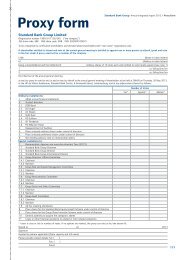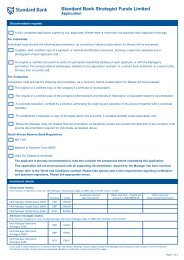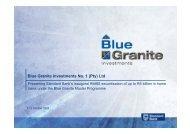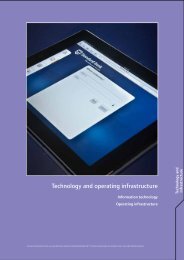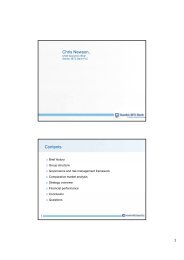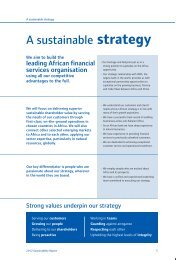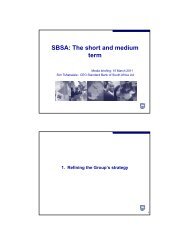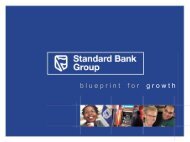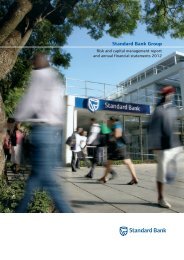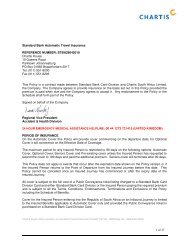Standard Bank Group - Standard Bank - Investor Relations
Standard Bank Group - Standard Bank - Investor Relations
Standard Bank Group - Standard Bank - Investor Relations
Create successful ePaper yourself
Turn your PDF publications into a flip-book with our unique Google optimized e-Paper software.
<strong>Standard</strong> <strong>Bank</strong> <strong>Group</strong>Audited results and dividend announcementfor the year ended 31 December 2010
<strong>Standard</strong> <strong>Bank</strong> <strong>Group</strong> audited results and dividend announcement 20103Liberty’s turnaround delivered a strong set of resultsin 2010.Headline earnings by geography%change2010Rm2009RmSouth Africa banking (1) 9 271 9 327Liberty >100 1 393 72South Africa 13 10 664 9 399Rest of Africa (38) 746 1 202Outside Africa (87) 186 1 479Outside Africa– ongoing (11) 1 284 1 446Outside Africa– curtailed (>100) (1 098) 33Central funding (313) (362)Total (4) 11 283 11 718South African banking headline earnings ended theyear down slightly with mixed fortunes within the twomajor business units: Personal & Business <strong>Bank</strong>ing SAup 35% and Corporate & Investment <strong>Bank</strong>ing SA down15%. Revenues from banking operations in the rest ofAfrica grew by 2% in a difficult operating environment,with headwinds including low levels of client activity,low interest rates and the translation impact of astronger rand. This revenue pressure occurred in ayear of continued investment in IT, infrastructure andpeople in anticipation of future business growth,together with write offs and provisions of R290 millionafter tax following an extensive review of financialcontrols across all countries. Headline earnings in therest of Africa were 38% lower than the prior year.Overall, headline earnings from our businesses outsideAfrica were 87% down on the prior year. Corporate &Investment <strong>Bank</strong>ing outside Africa saw a 34%decrease in revenues. Although restrained significantlyin the second half, cost growth in these operations andwrite downs and provisions of R1 098 million after taxin discontinued and curtailed operations, led toheadline earnings for Corporate & Investment <strong>Bank</strong>ingoutside Africa being down 95%. Personal & Business<strong>Bank</strong>ing outside Africa (comprising the Personal &Business <strong>Bank</strong>ing division of our operations inArgentina and our offshore banking and wealthbusinesses in the Channel Islands previously reportedwithin Corporate & Investment <strong>Bank</strong>ing) grew earningsduring the period and Personal & Business <strong>Bank</strong>ing inArgentina ended the year profitably.Performance review<strong>Standard</strong> <strong>Bank</strong> <strong>Group</strong> generated headline earnings ofR11,3 billion, down 4% on 2009. This result was verydifferent from what we had planned at the beginningof the year. We did not anticipate how gradual therecovery in our markets would be nor did we seeinterest rates going as low as they did in South Africaand elsewhere in Africa. For the first time in manyyears we had to contend with declining revenues.It became clear in the second half of the year thatmuch tougher cost management was necessary.After a detailed analysis of our cost base we cut costsin a range of areas. As staff costs are our largestexpense item, we halted recruitment in virtually allparts of the business and implemented a retrenchmentprocess aimed at removing inefficiencies, mainlyimpacting head office managers and executives inJohannesburg and London. Customer-facing staff andthose in high-growth geographies were largelyunaffected. In total, 953 employees in Johannesburgand London (2% of the group’s total permanentworkforce) were retrenched. This process resulted inonce-off pre tax costs of R610 million. Including arestructuring process undertaken in Argentina earlierin 2010, the group incurred total non-recurringrestructuring costs of R781 million in 2010, reportedcentrally in the group’s segmental analysis.Other cost-saving measures included downsizing ordelaying IT projects, reducing consulting servicesand cutting back travel and conference costs. Certainsponsorship agreements will not be renewed inMay 2011.Cost management will remain a key focus in 2011.Where feasible, we will relocate roles to less expensivejurisdictions and will continue to improve the efficiencyof our operational structures. The restructuringprocess has proved effective in breaking the group’s
6<strong>Standard</strong> <strong>Bank</strong> <strong>Group</strong> audited results and dividend announcement 2010Overview of financial results continued<strong>Bank</strong>ing staff costs were impacted by a 5% increasein headcount for the year and higher than inflationwage increases. After adjusting for the reduction inheadcount as a result of the restructuring process,the staff complement is up 3%, or approximately1 200 people higher than in 2009. This increasecomes almost exclusively from our growing operationson the ground in the rest of Africa.The 9% growth in other operating expenses includedhigher depreciation costs and continued investment inIT systems and infrastructure.Once-off restructuring costs comprise the staff andother costs of the restructuring exercises undertakenin the group during 2010: earlier in the year inArgentina and later in the year in Johannesburg andLondon head offices.In banking activities, income from associates and jointventures grew to R584 million, largely due to theinclusion of equity accounted earnings from ourinvestment in Troika Dialog in Russia for the first time,and the non-recurrence of impairments againstcarrying values of associates raised in 2009.Business unit performancePersonal & Business <strong>Bank</strong>ingHeadline earnings were up 23% to R4 750 million, inspite of flat revenues and supported by improvedcredit experience. Revenues were impacted by thenegative endowment impact on transactional accountbalances due to low interest rates, and furtherincreases in the cost of term funding needed tosupport mortgage lending growth. The divisionachieved an ROE of 17,9% (2009: 15,1%).Mortgage lending returned to profitability during theyear, generating headline earnings of R310 million.New mortgage loan applications rose steadily and newloans of R28 billion were registered. Coupled with thepurchase of a further R3 billion of mortgages from SAHome Loans, this pushed growth in the book up to 5%year-on-year notwithstanding a higher pre-paymentrate by customers. Margins were again impacted bythe higher cost of term funding but this was somewhatoffset by further improvements in customer pricing.Weighted average new business concessions in SouthAfrica improved to 0,20% in 2010 compared with0,79% in 2009. The <strong>Standard</strong> <strong>Bank</strong> of South Africa’smarket share of new business in mortgage lending iscurrently around 21% compared with 16% in 2009.As anticipated, the absolute value of mortgage NPLsstarted to come down towards the end of 2010, albeitmarginally. At the end of the year NPLs made up9,4% of the book compared with 10,1% a year earlier.The slower growth in NPLs and better outlook for debtrepayment allowed the division to reduce creditimpairment charges in home loans by 25%. Thisresulted in a credit loss ratio of 1,15% (2009: 1,59%).The proportion of debt review customers in themortgage NPL portfolio was reduced from R6,8 billionto R3,9 billion. NPLs arising from the debt reviewprocess remain a concern and are being carefully andproactively managed.The instalment finance business increased new loanpayouts due to relatively strong domestic vehicle salesoff a low base in the prior year. New business in theSouth African motor business grew 34% whilenon‐motor business managed only 2% growth asbusinesses struggled in the sluggish economy andmajor corporates used cash to purchase equipment.Despite the new business growth, increasinginstalment repayments on this ageing book resulted inyear end balances dropping by 7%. Credit impairmentshalved during the period and the credit loss ratio was1,93% compared to 3,49% in 2009.Credit cards showed healthy earnings growth for theyear despite lower revenues. Pressures on revenuescontinued with lower cardholder activity and loweroutstanding average balances as consumers reduceddebt obligations through most of the year. Newaccount growth has recently gained momentum, whichbodes well for the coming year. The credit loss ratiocame down to 3,78% from 5,61%, and lower fraudlosses as chip and pin cards are rolled out contributedto headline earnings growing 7%.
<strong>Standard</strong> <strong>Bank</strong> <strong>Group</strong> audited results and dividend announcement 20107Transactional and lending product deposit marginsremained under pressure due to the negativeendowment impact of lower interest rates ontransactional accounts in most of the countries inwhich we operate. Current account balances in boththe personal and business markets in South Africashowed positive growth of 12% and 19% respectively.Transactional banking accounts in the rest of Africagrew by almost 100 000 accounts. Most of thisaccount growth came from personal bankingcustomers, with Nigeria being the single biggestcontributor. Fee and commission income benefitedfrom account growth and modest price increases.Credit losses in the business banking book improvedalthough trading conditions remained difficult.Bancassurance and wealth includes the bank’sinsurance‐related businesses as well as the wealthmanagement businesses in the Channel Islands,previously reported as part of Corporate & Investment<strong>Bank</strong>ing. We continued to forge closer operational tieswith Liberty to grow bancassurance volumes and, inthe domestic market, there was a marginal increase inthe penetration rate for all products. The bancassurancebusinesses also recorded higher sales of complexproducts and improved claims loss ratios. The offshorewealth management businesses felt the impact oflower deposit margins due to international interestrates remaining structurally low for most of thefinancial year.Corporate & Investment <strong>Bank</strong>ingHeadline earnings fell 30% to R5 248 million. Thedifficult market conditions in the first half of the yearpersisted into the second half, with market uncertaintycontinuing to have a detrimental impact on revenues,which were down 16%. A significant improvement incredit experience helped offset revenue pressuresalthough costs escalated as we continued to buildour franchise in the rest of Africa. The decline inprofitability resulted in an ROE of 12,7%(2009: 18,8%).Global markets operated in a challenging environmentcharacterised by lower levels of client activity. Stablelow interest rates across most currencies providedlimited hedging opportunities for clients. Revenueswere down 23% from the high base set in 2009,affected by income previously earned through asubsidiary in Russia now being accounted for on a netbasis as earnings from associates, following theinvestment in Troika Dialog, and not as trading income.Costs incurred in building trading platforms in physicalcommodities and equities resulted in headline earningsfalling by 49%.Investment banking saw some signs of recovery withclient activity increasing in the second half. Advisoryfees from cross‐border activities benefited from anumber of important landmark transactions. There wasan improvement in term lending, particularly in SouthAfrica and Nigeria. The turnaround in creditimpairments as client positions improved and prioryear provisions were reversed resulted in a 75% climbin headline earnings.Transactional products and services income was down11%. Margins were squeezed by the negativeendowment effect on transactional balances andintensifying competition across Africa. We continuedto make significant investments in IT platforms tomaintain market leadership in South Africa and buildtransactional capabilities across our African franchise.Principal investment management, previously includedin investment banking, comprises investments inprivate equity, real estate and debt funds. Lower fairvalue gains during 2010 impacted this business.Certain activities which are non-core in relation to ourrefocused strategy have been curtailed and are in theprocess of being wound down. These activitiesincurred a loss of R1 098 million in 2010 and includecredit impairments arising from a portfolio ofstructured loans to high net worth individuals outsideof Africa and fair value write downs of investments indistressed debt in Asia. These businesses were alsopreviously reported in investment banking.The underlying performance in Troika was satisfactoryduring 2010. We equity accounted USD51 million of
8<strong>Standard</strong> <strong>Bank</strong> <strong>Group</strong> audited results and dividend announcement 2010Overview of financial results continuedearnings of which USD16 million represented ourshare of the operating profit of Troika and USD35million related to the recovery of underlying assetvalues post acquisition.Wealth – LibertyThe financial results of Liberty arise from the group’s53,7% investment in Liberty Holdings Limited(Liberty). Bancassurance results are included underPersonal & Business <strong>Bank</strong>ing. Normalised headlineearnings were R2 597 million for the year compared toR135 million reported in the prior year, a significantimprovement indicating a return to more normal levelsof earnings from core insurance operations. Of theseheadline earnings, R1 393 million was attributable to<strong>Standard</strong> <strong>Bank</strong> <strong>Group</strong> (2009: R72 million). Thesignificant recovery in earnings resulted fromsubstantially improved persistency and from theimpact of investment markets on Liberty’s book.Positive returns on bonds, equity and preferenceshares assisted in strong growth in investment incomeand gains. Net cash flows into asset managementoperations improved significantly and assets undermanagement grew by 16%. Growth in net insurancepremiums remained low at 1% and indexed newbusiness was down 2%. Earnings were negativelyimpacted by higher death claims on core risk products,lower new business margins and higher memberattrition and risk claims in health operations.Normalised total embedded value increased by 8%and Liberty achieved a 13,4% return on embeddedvalue.Shareholders are referred to the full Liberty resultsannouncement dated 24 February 2011.Capital and liquidity managementThe group remains well capitalised with a tier I capitaladequacy ratio of 12,9% and a total capital adequacyratio of 15,3%, well above the group’s internal targets.Liberty’s capital adequacy level at December 2010was strong at 2,67 times the required cover.The group executed a number of key term loanfunding transactions, taking advantage of pockets ofwell-priced liquidity. Compared to the height of theglobal financial crisis, global interbank fundingconditions were stable, tenors have lengthened andspreads have compressed. In the South African market,weaker credit demand and surplus liquidity havestarted to lower the cost of term liquidity. <strong>Investor</strong>appetite for capital markets issuance remained robustand The <strong>Standard</strong> <strong>Bank</strong> of South Africa successfullyplaced R4,35 billion of senior debt in the domesticbond market.The group increased its long-term funding ratio to26,6% and retained a very conservative liquiditybuffer with surplus liquidity totalling R106,8 billion at31 December 2010.<strong>Standard</strong> <strong>Bank</strong> participated in the quantitative impactstudy that the Basel Committee conducted during2010 and preliminary results showed that our tier Iratio would decrease slightly under the proposed BaselIII framework. We are confident, however, that we areadequately capitalised to meet the new requirements.We continue to assess the impact of the liquiditystandards as proposed by the Basel Committee. Thesemay prove to be onerous, depending on the extent ofnational discretion applied by domestic bankingregulators.
<strong>Standard</strong> <strong>Bank</strong> <strong>Group</strong> audited results and dividend announcement 20109DividendsGiven the strong capital position of the group and theimproving outlook described below, a final cashdividend of 245 cents has been declared, bringing thefull dividend for the year to 386 cents, the same levelas the prior three years. This declaration results individend cover for the year of 1,85 times, compared tothe group’s medium term dividend cover objective of2,5 times.ProspectsSigns are that the global economy will continue torecover slowly, but the combined threats of increasinginflation in developing economies and budget deficitsin Europe pose risks to economic growth.In Sub-Saharan Africa, we expect domestic demand toremain strong given rising real incomes and sustainedprivate and public investment. In addition, exports areexpected to benefit from the reorientation of tradetoward the faster-growing markets in Asia. Africa isfirmly in the company of the emerging marketsoutperforming the global economy in the mediumterm. However, growth will remain contingent on theimproving health of the global economy and whilethere is certainly appetite for investment-led growth,there are a number of African countries facingsignificant political risk in the coming year.Strategically we are well positioned and our capitaladequacy is strong. After two extremely difficult yearswe are focusing on improving our ROE throughrevenue generation and cost containment.We have taken decisive action to address our costbase, improve operational efficiency and close poorlyperforming business lines. We believe these initiatives,combined with an ongoing decline in creditimpairments, will have a positive impact on ourfinancial performance and that we are well positionedto resume growth in earnings.Any forward looking information contained in thisannouncement has not been reviewed or audited bythe group’s auditors.Jacko MareeChief executive2 March 2011Fred PhaswanaChairman
<strong>Standard</strong> <strong>Bank</strong> <strong>Group</strong> audited results and dividend announcement 201011Ordinary share certificates may not be dematerialisedor rematerialised between Monday, 4 April 2011 andFriday, 8 April 2011, both days inclusive.Preference share certificates (first and second) maynot be dematerialised or rematerialised betweenMonday, 28 March 2011 and Friday, 1 April 2011,both days inclusive.Where applicable, dividends in respect of certificatedshares will be transferred electronically toshareholders’ bank accounts on the payment date.In the absence of specific mandates, dividendcheques will be posted to shareholders. Preferenceshareholders (first and second) who holddematerialised shares will have their accounts at theirCSDP or broker credited on Monday, 4 April 2011.Ordinary shareholders who hold dematerialised shareswill have their accounts at their CSDP or brokercredited on Monday, 11 April 2011.On behalf of the boardLoren Wulfsohn<strong>Group</strong> secretary
12<strong>Standard</strong> <strong>Bank</strong> <strong>Group</strong> audited results and dividend announcement 2010Normalised results (unaudited)With effect from 2004, we have adjusted the group’sresults reported under IFRS for required accountingconventions that do not reflect the underlyingeconomic substance of transactions. To arrive at thenormalised results the IFRS results have been adjustedfor the following items: preference share funding for the group’s BlackEconomic Empowerment Ownership initiative(Tutuwa) transaction that is deducted from equityand reduces the shares in issue in terms of IFRS;and group companies shares held for the benefit ofLiberty policyholders that result in a reductionof the number of shares in issue and the exclusionof fair value adjustments and dividends on theseshares. The IFRS requirement causes an accountingmismatch between income from investments andchanges in policyholders’ liabilities.During the year the group entered into transactions onits own shares to facilitate client trading activities. Aspart of the normal trading operations, a groupsubsidiary offers to its clients trading positions oflisted shares, including its own shares. In order tohedge the risk on these shares the subsidiary buys orsells short group shares in the market. Although theshare exposure on the group’s own shares is deductedfrom equity and the related fair value movements arereversed in the income statement on consolidation,the client trading position and fair value movementsare not eliminated, resulting in an accountingmismatch. In addition to the two anomalies describedabove, the group has corrected this accountingmismatch resulting from the application of IFRS inpreparing the normalised results.
<strong>Standard</strong> <strong>Bank</strong> <strong>Group</strong> audited results and dividend announcement 201013The result of these adjustments is shown in the table below:Normalised headline earningsWeightedaveragenumberof shares’000HeadlineearningsRmGrowth on2009%Disclosed on an IFRS basis 1 491 956 10 969 (3)Tutuwa initiative 63 479 236<strong>Group</strong> shares held for the benefit of Libertypolicyholders 23 843 135Share exposures held to facilitate client tradingactivities (3 186) (57)Normalised 1 576 092 11 283 (4)
14<strong>Standard</strong> <strong>Bank</strong> <strong>Group</strong> audited results and dividend announcement 2010Abridged audited results in accordance with IFRSFinancial statisticsfor the year ended 31 December%change 2010 2009Number of ordinary shares in issue (000's)– end of year 2 1 505 093 1 474 344– weighted average 2 1 491 956 1 459 337– diluted weighted average 2 1 548 001 1 511 038Cents per ordinary shareHeadline earnings (5) 735,2 771,1Diluted headline earnings (5) 708,6 744,7Dividend 386,0 386,0Basic earnings (5) 722,1 757,5Diluted earnings (5) 696,0 731,6Net asset value 2 5 785 5 699Financial performance (%)ROE 12,7 13,7Net interest margin 3,00 3,19Credit loss ratio 1,05 1,60Cost-to-income ratio 61,8 52,3Capital adequacy (%)Capital ratios (unaudited)– tier I capital 12,9 11,9– total capital 15,3 15,1
<strong>Standard</strong> <strong>Bank</strong> <strong>Group</strong> audited results and dividend announcement 201015Consolidated income statementfor the year ended 31 December%change2010Rm2009 1RmIncome from banking activities (6) 58 746 62 828Net interest income (8) 28 742 31 316Non-interest revenue (5) 30 004 31 512Income from investment management and life insurance activities 18 51 149 43 458Total income 3 109 895 106 286Credit impairment charges (38) 7 524 12 097Benefits due to policyholders 10 37 335 33 935Income after credit impairment charges and policyholders'benefits 8 65 036 60 254Operating expenses in banking activities 12 36 656 32 827Operating expenses in investment management and life insuranceactivities 4 9 388 9 052Net income before goodwill 3 18 992 18 375Goodwill impairment >100 144 42Net income before associates and joint ventures 3 18 848 18 333Share of profit from associates and joint ventures >100 633 33Net income before indirect taxation 6 19 481 18 366Indirect taxation (14) 1 475 1 710Profit before direct taxation 8 18 006 16 656Direct taxation 7 4 999 4 660Profit for the year 8 13 007 11 996Attributable to non-controlling interests >100 1 846 411Attributable to preference shareholders (27) 387 531Attributable to ordinary shareholders (3) 10 774 11 054Basic earnings per share (cents) (5) 722,1 757,5Diluted earnings per share (cents) (5) 696,0 731,61Restated.
16<strong>Standard</strong> <strong>Bank</strong> <strong>Group</strong> audited results and dividend announcement 2010Abridged audited results in accordance with IFRS continuedHeadline earningsfor the year ended 31 December%change2010Rm2009Rm<strong>Group</strong> profit attributable to ordinary shareholders (3) 10 774 11 054Headline earnings adjustable items added back 296 205Goodwill impairments – IFRS 3 144 42Loss on deemed disposal of associate – IFRS 3 10Profit on sale of property and equipment – IAS 16 (23) (38)Impairment of property and equipment – IAS 16 46Realised foreign currency translation reserve on foreign operations– IAS 21 21 (18)Losses on the disposal of businesses and divisions – IAS 27 30 7Impairment of associates – IAS 28 29 379Reversal of impairment of associates – IAS 28 (19)Impairment of intangible assets – IAS 38 179 96Realised gains on available-for-sale assets – IAS 39 (75) (309)Taxation on headline earnings adjustable items (28) 16Non-controlling interests’ share of headline earnings adjustable items (73) (22)Headline earnings (3) 10 969 11 253
<strong>Standard</strong> <strong>Bank</strong> <strong>Group</strong> audited results and dividend announcement 201017Consolidated statement of financial positionas at 31 December%change2010Rm2009 1RmAssetsCash and balances with central banks 15 28 675 24 983Financial investments, trading and pledged assets 4 370 364 355 287Loans and advances (1) 710 722 721 389Loans and advances to banks (4) 107 090 111 068Loans and advances to customers (1) 603 632 610 321Investment property 13 21 521 19 058Derivative and other assets 20 169 203 140 601Interest in associates and joint ventures 11 10 533 9 529Goodwill and other intangible assets 10 10 383 9 409Property and equipment 22 14 907 12 250Total assets 3 1 336 308 1 292 506Equity and liabilitiesEquity 4 103 198 99 369Equity attributable to ordinary shareholders 4 87 073 84 022Ordinary share capital 2 159 156Ordinary share premium 2 17 363 17 041Reserves 4 69 551 66 825Preference share capital and premium 5 503 5 503Non-controlling interest 8 10 622 9 844Liabilities 3 1 233 110 1 193 137Deposit and current accounts 3 789 500 768 548Deposits from banks (13) 91 729 106 018Deposits from customers 5 697 771 662 530Derivative, trading and other liabilities 4 222 594 213 633Policyholders' liabilities 7 197 878 184 300Subordinated debt (13) 23 138 26 656Total equity and liabilities 3 1 336 308 1 292 5061Restated.
18<strong>Standard</strong> <strong>Bank</strong> <strong>Group</strong> audited results and dividend announcement 2010Abridged audited results in accordance with IFRS continuedContingent liabilities and capital commitmentsas at 31 December2010Rm2009RmLetters of credit and bankers’ acceptances 10 407 10 784Guarantees 29 327 29 078Contingent liabilities 39 734 39 862Contracted capital expenditure 2 662 1 689Capital expenditure authorised but not yet contracted 8 415 10 075Capital commitments 11 077 11 764Consolidated cash flow informationfor the year ended 31 December2010Rm2009RmNet cash flows from operating activities 27 164 6 295Net cash flows used in investing activities (13 912) (7 372)Net cash flows (used in)/from financing activities (7 810) 2 887Effects of exchange rate changes on cash and cash equivalents (1 750) (2 524)Net increase/(decrease) in cash and cash equivalents 3 692 (714)Cash and cash equivalents at beginning of the year 24 983 25 697Cash and cash equivalents at end of the year 28 675 24 983
<strong>Standard</strong> <strong>Bank</strong> <strong>Group</strong> audited results and dividend announcement 201019Consolidated statement of comprehensive incomefor the year ended 31 DecemberOrdinaryshareholders’equityRm2010Noncontrollinginterests andpreferenceshareholdersRmTotalRm2009TotalRmProfit for the year 10 774 2 233 13 007 11 996Other comprehensive income after tax forthe year (4 509) (844) (5 353) (9 464)Exchange rate differences on translatingequity investment in foreign operations (3 561) (845) (4 406) (9 567)Foreign currency hedge of net investment (768) (768) (106)Cash flow hedges (214) (214) 85Available-for-sale financial assets 71 45 116 40Revaluation and other (losses)/gains (37) (44) (81) 84Total comprehensive income for the year 6 265 1 389 7 654 2 532Attributable to non-controlling interests 1 002 1 002 (1 658)Attributable to equity holders of the parent 6 265 387 6 652 4 190Attributable to preference shareholders 387 387 531Attributable to ordinary shareholders 6 265 6 265 3 659
20<strong>Standard</strong> <strong>Bank</strong> <strong>Group</strong> audited results and dividend announcement 2010Abridged audited results in accordance with IFRS continuedConsolidated statement of changes in equityfor the year ended 31 DecemberOrdinaryshareholders’equityRmPreferenceshare capitaland premiumRmNoncontrollinginterestRmBalance at 1 January 2009 81 953 5 503 12 045 99 501Total comprehensive income for the year 3 659 531 (1 658) 2 532Transactions with owners, recorded directlyin equity (1 590) (531) (543) (2 664)Equity-settled share-based payment transactions 307 37 344Tax on share-based payments 58 58Issue of share capital and share premium 200 (10) 190Net decrease in treasury shares 691 316 1 007Dividends paid (2 846) (531) (886) ( 4 263)Balance at 31 December 2009 84 022 5 503 9 844 99 369Balance at 1 January 2010 84 022 5 503 9 844 99 369Total comprehensive income for the year 6 265 387 1 002 7 654Transactions with owners, recorded directlyin equity (3 214) (387) (224) (3 825)Equity-settled share-based paymenttransactions 412 32 444Tax on share-based payments 2 2Change in shareholding of subsidiary (37) 36 (1)Issue of share capital and share premium andcapitalisation of reserves 205 30 235Net increase in treasury shares (23) 449 426Dividends paid (3 773) (387) (771) (4 931)Balance at 31 December 2010 87 073 5 503 10 622 103 198TotalRm
<strong>Standard</strong> <strong>Bank</strong> <strong>Group</strong> audited results and dividend announcement 201021Segment reportfor the year ended 31 December%change2010Rm2009 1RmRevenue contribution by business unitPersonal & Business <strong>Bank</strong>ing 34 975 34 855Corporate & Investment <strong>Bank</strong>ing (16) 22 663 27 020Central and other 45 1 212 835<strong>Bank</strong>ing activities (6) 58 850 62 710Liberty 16 51 466 44 338<strong>Standard</strong> <strong>Bank</strong> <strong>Group</strong> – Normalised 3 110 316 107 048Adjustment for IFRS (421) (762)<strong>Standard</strong> <strong>Bank</strong> <strong>Group</strong> – IFRS 3 109 895 106 286Profit and loss attributable to ordinary shareholdersPersonal & Business <strong>Bank</strong>ing 34 4 674 3 477Corporate & Investment <strong>Bank</strong>ing (31) 5 227 7 615Central and other (>100) (136) 355<strong>Bank</strong>ing activities (15) 9 765 11 447Liberty >100 1 323 72<strong>Standard</strong> <strong>Bank</strong> <strong>Group</strong> – Normalised (4) 11 088 11 519Adjustment for IFRS (314) (465)<strong>Standard</strong> <strong>Bank</strong> <strong>Group</strong> – IFRS (3) 10 774 11 0541Reclassified.
22<strong>Standard</strong> <strong>Bank</strong> <strong>Group</strong> audited results and dividend announcement 2010Abridged audited results in accordance with IFRS continuedPrivate equity associates and joint venturesfor the year ended 31 December2010Rm2009RmCost 382 409Carrying value 641 658Fair value 651 818Loans (from)/to associates and joint ventures (37) 432Equity accounted income 43 128Reports of the independent auditorsThe unmodified audit reports of KPMG Inc. and PwC Inc., the independent auditors, on the annual financialstatements and the summarised financial statements contained herein for the year ended 31 December 2010,dated 2 March 2011, are available for inspection at the registered office of the company.
<strong>Standard</strong> <strong>Bank</strong> <strong>Group</strong> audited results and dividend announcement 201023Accounting policiesBasis of preparationThese audited results are a summary of theconsolidated financial statements and are prepared inaccordance with the recognition and measurementcriteria of International Financial Reporting <strong>Standard</strong>s(IFRS), its interpretations adopted by the InternationalAccounting <strong>Standard</strong>s Board (IASB), the presentationand the disclosure requirements of IAS 34 InterimFinancial Reporting, the AC 500 standards as issued bythe Accounting Practices Board or its successor, theListings Requirements of the JSE Limited and therequirements of the South African Companies Act 61of 1973, as amended. The consolidated financialresults are prepared in accordance with the goingconcern principle under the historical cost basis asmodified by the fair value accounting of certain assetsand liabilities where required or permitted by IFRS.The consolidated financial statements are presentedin South African rand. All amounts are stated in millionsof rand (Rm), unless indicated otherwise.Changes in accounting policiesThe accounting policies are consistent with thoseadopted in the previous year except for the standardsand interpretations noted below and are in terms ofIFRS.Adoption of new standards and interpretationseffective for the current financial yearThe group has adopted the following revised IFRSprospectively as of 1 January 2010: IFRS 3 Business Combinations (revised 2008); and IAS 27 Consolidated and Separate FinancialStatements (revised 2008).Whilst the revised IFRS have resulted in changes to thegroup’s accounting policies, the adoption of theserevised standards has had no material effect on theresults, nor has it required any restatements ofthe results.The group has also adopted all other effective newand amended IFRS (not previously early adopted) as of1 January 2010, with no material impact on thegroup’s accounting policies or results, and norestatement of prior year results.Early adoption of new standards andinterpretationsThe group has early adopted the following new andamended IFRS as of 1 January 2010 with no materialimpact on the group’s accounting policies or results,and no restatement of the prior year results: IFRS 1 First-time Adoption of InternationalFinancial Reporting <strong>Standard</strong>s (IFRS 1) (2010Improvements to IFRS); IFRS 1 Severe Hyperinflation and Removal of FixedDates for First-time Adopters; IFRS 3 Business Combinations (revised 2008)(2010 Improvements to IFRS); IAS 1 Presentation of Financial Statements (2010Improvements to IFRS); IAS 27 Consolidated and Separate FinancialStatements (2010 Improvements to IFRS); and IFRIC 13 Customer Loyalty Programmes (2010Improvements to IFRS).The group has also early adopted the amendments toIAS 12 Income Taxes (Deferred Tax: Recovery ofUnderlying Assets). Comparative information has beenrestated to conform to the revised standard. This hasresulted in the deferred tax liability in respect ofinvestment property surpluses being restated to thesale rate and has correspondingly increasedpolicyholder liabilities. The adoption of thisamendment has had no impact on headline earnings orearnings per share.Reclassifications and restatementsA review of the group’s derivative positions wasundertaken during the course of the year to determinewhether the presentation applied was in accordancewith international best practice. The group’s crosscurrency interest rate swap contracts incorporate, asstandard market practice, reset dates on which cashflows are exchanged to manage the credit risk on thecontract’s notional amounts. These cash flows havehistorically been presented as derivative assets andliabilities separately from the underlying derivativecontract. Following the review it was decided topresent the cash flows, together with the underlyingderivative contract, as a single contractual relationshipwith the group’s counterparty. The group believes that
24<strong>Standard</strong> <strong>Bank</strong> <strong>Group</strong> audited results and dividend announcement 2010this treatment better reflects the nature of theunderlying transactions and the credit risk of itsrelationship with its counterparty.The group routinely enters into soft (for example,maize) and hard (for example, precious metals)commodity based financing transactions. Hardcommodity based financing transactions within thetrading book have historically been accounted for aseither outright purchases, by recognising a commodityand related derivative forward sales agreement, orsales, through derecognition of the commodity andrecognition of a related derivative forward purchaseagreement. The group has revised the accountingtreatment for these transactions based on marketpractice and analogy to IFRS requirements for similarfinancing transactions with a financial instrumentunderlying. The group’s revised policy treats certainof the group’s hard commodity based financingtransactions as either buy to sell backs (collateralisedlending), where a reverse repurchase agreementwithin trading assets is recognised, or sell to buy backs(collateralised borrowing), where the commoditycontinues to be recognised together with a repurchaseagreement within trading liabilities. These financingtransactions are accounted for in accordance with thegroup’s existing accounting policy for ‘Sale andrepurchase agreements and lending of securities’.For the classification of loans and advances to banks,banks are defined as entities that are regulateddeposit taking institutions. In previous reportingperiods, overnight placements with certain bankinggroups, which are not regulated deposit takinginstitutions, were included under loans to banks.These placements have now been classified tocustomers.The comparative statements of financial position havebeen adjusted to reflect the presentationconsequences of the reclassifications.
<strong>Standard</strong> <strong>Bank</strong> <strong>Group</strong> audited results and dividend announcement 201025AdministrationAdministrative information<strong>Standard</strong> <strong>Bank</strong> <strong>Group</strong> LimitedRegistration No. 1969/017128/06Incorporated in the Republic of South AfricaDirectorsTMF Phaswana (Chairman), Hongli Zhang** (Deputy chairman), SJ Macozoma (Deputy chairman), JH Maree*(Chief executive), DDB Band, RMW Dunne#, TS Gcabashe, SE Jonah KBE##, Sir Paul Judge#, KP Kalyan, YaganLiu**, Adv KD Moroka, AC Nissen, MC Ramaphosa, SP Ridley*, MJD Ruck, Lord Smith of Kelvin, Kt#, EM Woods*Executive director **Chinese #British ##Ghanaian<strong>Group</strong> secretaryL WulfsohnRegistered office9th Floor, <strong>Standard</strong> <strong>Bank</strong> Centre, 5 Simmonds Street, Johannesburg 2001.PO Box 7725, Johannesburg 2000.Share transfer secretaries inSouth AfricaComputershare <strong>Investor</strong> Services (Proprietary) Limited70 Marshall Street, Johannesburg 2001PO Box 61051, Marshalltown 2107Independent sponsorDeutsche Securities (Proprietary) LimitedNamibiaTransfer Secretaries (Proprietary) LimitedShop 8, Kaiserkrone Centre,Post Street Mall, WindhoekPO Box 2401, WindhoekJoint sponsor<strong>Standard</strong> <strong>Bank</strong>
www.standardbank.com



